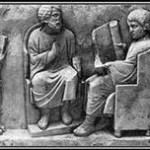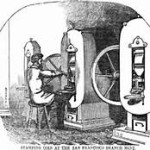We mimic what we see others do.
Developmental psychology mimics the New Testament.
 I was recently reminded of the connection between developmental psychology and Paul’s words in 1 Corinthians 4:16, “I urge you to imitate me.” I went back to the text to study the Greek concept of “imitation” (see the whole context in 4:14-21). What I found was fascinating. Every time the noun form of “mimic” is used (we get our English word directly from the Greek; cf. 1 Co 11:1; Eph 5:1; 1 Th 1:6; 2:14, etc.) in the NT the verb ginomai gives the action–“to become.” The present imperative drives the imitator to develop character based on the given model. In short, the biblical framework informs every developmentalist’s model.
I was recently reminded of the connection between developmental psychology and Paul’s words in 1 Corinthians 4:16, “I urge you to imitate me.” I went back to the text to study the Greek concept of “imitation” (see the whole context in 4:14-21). What I found was fascinating. Every time the noun form of “mimic” is used (we get our English word directly from the Greek; cf. 1 Co 11:1; Eph 5:1; 1 Th 1:6; 2:14, etc.) in the NT the verb ginomai gives the action–“to become.” The present imperative drives the imitator to develop character based on the given model. In short, the biblical framework informs every developmentalist’s model.
 Albert Bandura, following the behaviorists, introduced “new” ideas of cognitive repetition with his “bobo doll studies.” Bandura had children watch a video of other children repeatedly knocking down a rubber bounce-back doll. The result of observation was imitation which moved to changed behavior. The children immediately went into the next room to do what they had just seen. Bandura’s observations (attention, retention, reproduction, motivation) emphasized that imitation causes people to demonstrate what they have learned, not to cause learning in and of itself. Bandura concluded, as a good humanist should, that the focus is on self. Response to imitation should be self-regulation, self-determination, self-control, even contractual obligations begun with oneself.
Albert Bandura, following the behaviorists, introduced “new” ideas of cognitive repetition with his “bobo doll studies.” Bandura had children watch a video of other children repeatedly knocking down a rubber bounce-back doll. The result of observation was imitation which moved to changed behavior. The children immediately went into the next room to do what they had just seen. Bandura’s observations (attention, retention, reproduction, motivation) emphasized that imitation causes people to demonstrate what they have learned, not to cause learning in and of itself. Bandura concluded, as a good humanist should, that the focus is on self. Response to imitation should be self-regulation, self-determination, self-control, even contractual obligations begun with oneself.
 The biblical model, however, forces us to acknowledge that what our students emulate because of us is The One we follow. 2 Thessalonians 3:7, 9 takes us yet another step. Paul commands (“must”) that the church follow his leadership. Essentially, no message can ever be effective outside of the personal lifestyle pattern of the one speaking. The power of the command is clear though difficult for us to enact as we are concerned with humility.
The biblical model, however, forces us to acknowledge that what our students emulate because of us is The One we follow. 2 Thessalonians 3:7, 9 takes us yet another step. Paul commands (“must”) that the church follow his leadership. Essentially, no message can ever be effective outside of the personal lifestyle pattern of the one speaking. The power of the command is clear though difficult for us to enact as we are concerned with humility.
Imitating positive role models has ancient roots with philosophers, rabbis, and teachers. But Scripture takes it another step as Timothy the modeler becomes the model for others (1 Co 4:17). Paul was not asking the Corinthians to practice anything different from what was done elsewhere “everywhere in every church” (cf. 1 Co 7:17; 11:16; 14:33, 36). The Corinthians were to become what the Thessalonians had become already–the developmental model which was now the model for others.
 The imitators were imitated leaving an “example” for others to follow (1 Th 1:6). The Greek word is “type” which originally meant, a mark that left a blow or a design stamped on a coin, leaving a pattern—something to be copied and followed (cf. Titus 2:7; 1 Peter 5:3). The word order emphasizes “a result reached” (Morris, Thessalonians, 59-60). For those of us who quiver at a “results-centered” emphasis in The Church we might anticipate but be careful not to expect results.
The imitators were imitated leaving an “example” for others to follow (1 Th 1:6). The Greek word is “type” which originally meant, a mark that left a blow or a design stamped on a coin, leaving a pattern—something to be copied and followed (cf. Titus 2:7; 1 Peter 5:3). The word order emphasizes “a result reached” (Morris, Thessalonians, 59-60). For those of us who quiver at a “results-centered” emphasis in The Church we might anticipate but be careful not to expect results.
No where else does Paul mark a church as an example to follow as he does with Thessalonica (1 Th 1:8). Perhaps this model of modeling could be explored further so as to mark biblical developmental thinking. Paul puts developmental theory “on notice” that in order to model we must “give ourselves” to others (1 Th 2:8). Scripture is clear about maturation–it is more difficult to “take affect” unless a lifestyle accompanies the teaching (cf. Gal 4:12; Phil 3:17).
 There are other words which further elucidate the model of modeling. “Walk the line” (Rom 4:12; Acts 21:24; Gal 5:25), “follow in his footsteps or tracks” (2 Co 12:18; 1 Pet 2:21), and “devotion” (1 Tim 5:10, 24) are metaphors which authenticate (cf. Mark 16:20) the talk with the walk. It is possible to follow the wrong behavior (2 Peter 2:2, 15) which is the reason why Bandura’s “operational learning” must be allied to The Personal Eternal Triune Creator.
There are other words which further elucidate the model of modeling. “Walk the line” (Rom 4:12; Acts 21:24; Gal 5:25), “follow in his footsteps or tracks” (2 Co 12:18; 1 Pet 2:21), and “devotion” (1 Tim 5:10, 24) are metaphors which authenticate (cf. Mark 16:20) the talk with the walk. It is possible to follow the wrong behavior (2 Peter 2:2, 15) which is the reason why Bandura’s “operational learning” must be allied to The Personal Eternal Triune Creator.
Among the many other ideas I found interesting was this: to reject an authority’s recommended representative or model was to disrespect the authority himself who had written on their behalf (Heb 13:7; 3 John 11). The role model has a role to play. It behooves us to know who we model. The developmentalists can theorize about the process of imitated behavior but have no basis for its authority. Always the answer to “why” we do something is tied directly to transcendent truth seen through the lives of our role models (cf. 2 Cor 3:2).
May our students find us worthy of imitation.
Originally written in 2006. Mark’s granddaughter Marilyn reminds him what an impact imitation has every time he’s with her. Dr. Mark Eckel is president of The Comenius Institute.


